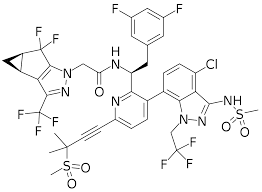Astellas Pharma Inc. announced the U.S. Food and Drug Administration (FDA) approval of Veozah (fezolinetant) 45 mg once daily for the treatment of moderate to severe vasomotor symptoms (VMS) due to menopause on May 12. Veozah is the first nonhormonal neurokinin 3 (NK3) receptor antagonist approved to treat VMS due to menopause.
“Today’s approval of fezolinetant is a significant and, I believe, long awaited milestone for individuals in the U.S. who experience moderate to severe vasomotor symptoms during the menopausal transition,” said Genevieve Neal-Perry, M.D., Ph.D., Chair, UNC School of Medicine Department of Obstetrics and Gynecology. “This therapy is based on our understanding of the biology behind hot flashes. I’m excited to know that patients will have the option to choose this nonhormonal treatment.”
Before menopause, there is a balance between estrogens (hormones made by a woman’s ovaries) and neurokinin B (NKB), a brain chemical. This balance regulates the body’s temperature control center located in a specific area of the brain. As the body goes through menopause, estrogens decline and this balance is disrupted. This imbalance can lead to very uncomfortable symptoms called VMS. Veozah helps to restore the balance by blocking NKB in the temperature control center to reduce the number and intensity of hot flashes.
“Veozah uses a novel mechanism of action to target the root cause of VMS due to menopause,” said Marci English, Vice President and Head of BioPharma Development, Astellas. “FDA approval of this new treatment for moderate to severe VMS due to menopause is a testament to Astellas’ commitment to delivering innovative therapies in areas of unmet need that have been underserved, including women’s health.”
The approval is supported by results from the BRIGHT SKY™ program, which included three Phase 3 clinical trials as part of a development program that collectively enrolled over 3,000 individuals across the U.S., Canada and Europe. Results from the SKYLIGHT 1™ and SKYLIGHT 2™ pivotal trials characterize the efficacy and safety of fezolinetant for the treatment of moderate to severe VMS due to menopause. Data from the SKYLIGHT 4™ safety study further characterizes the long-term safety profile of fezolinetant.
VMS, characterized by hot flashes and/or night sweats, are common symptoms of menopause. VMS are the most common symptoms of menopause for which women seek treatment. In the U.S., about 60% to 80% of women experience these symptoms during or after the menopausal transition. VMS can have a disruptive impact on women’s daily activities and overall quality of life.
“Today’s approval of fezolinetant is a significant and, I believe, long awaited milestone for individuals in the U.S. who experience moderate to severe vasomotor symptoms during the menopausal transition,” said Genevieve Neal-Perry, M.D., Ph.D., Chair, UNC School of Medicine Department of Obstetrics and Gynecology. “This therapy is based on our understanding of the biology behind hot flashes. I’m excited to know that patients will have the option to choose this nonhormonal treatment.”
Before menopause, there is a balance between estrogens (hormones made by a woman’s ovaries) and neurokinin B (NKB), a brain chemical. This balance regulates the body’s temperature control center located in a specific area of the brain. As the body goes through menopause, estrogens decline and this balance is disrupted. This imbalance can lead to very uncomfortable symptoms called VMS. Veozah helps to restore the balance by blocking NKB in the temperature control center to reduce the number and intensity of hot flashes.
“Veozah uses a novel mechanism of action to target the root cause of VMS due to menopause,” said Marci English, Vice President and Head of BioPharma Development, Astellas. “FDA approval of this new treatment for moderate to severe VMS due to menopause is a testament to Astellas’ commitment to delivering innovative therapies in areas of unmet need that have been underserved, including women’s health.”
The approval is supported by results from the BRIGHT SKY™ program, which included three Phase 3 clinical trials as part of a development program that collectively enrolled over 3,000 individuals across the U.S., Canada and Europe. Results from the SKYLIGHT 1™ and SKYLIGHT 2™ pivotal trials characterize the efficacy and safety of fezolinetant for the treatment of moderate to severe VMS due to menopause. Data from the SKYLIGHT 4™ safety study further characterizes the long-term safety profile of fezolinetant.
Ref : https://en.wikipedia.org/wiki/Fezolinetant













